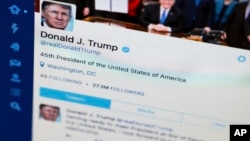President Donald Trump can block his critics from following him on Twitter without violating the First Amendment despite a lawsuit’s claims that it violates the Constitution to do so, government lawyers say.
Trial attorneys with the U.S. Department of Justice in Washington submitted papers late Friday to a New York federal judge, saying a lawsuit challenging Trump over the issue should be thrown out.
“The president uses the account for his speech, not as a forum for the private speech of others,” the lawyers wrote. “And his decision to block certain users allows him to choose the information he consumes and the individuals with whom he interacts — expressive choices that public officials retain the right to make, even when those choices are made on the basis of viewpoint.”
Not a state action
They say the president’s decision to stop some individuals from following him on his 8-year-old @realdonaldtrump account, which has more than 40 million followers, is not state action. Public officials, they add, sometimes announce a new policy initiative or make statements about public policy on the campaign trail or in meetings with leaders of a political party.
“The fact that an official chooses to make such an announcement in an unofficial setting does not retroactively convert into state action the decision about which members of the public to allow into the event,” the lawyers said.
The lawyers said his Twitter account “is not a right conferred by the presidency,” but rather is a private platform run by a private company.
In a warning that ruling against Trump might threaten the constitutional separation of powers, the lawyers wrote that “courts are prohibited from enjoining the discretionary conduct of the president.”
Institute responds
The lawsuit was filed in July by the Knight First Amendment Institute at Columbia University and seven people rejected by Trump after criticizing the president.
Jameel Jaffer, the institute’s director, said Trump’s lawyers were wrong in their legal analysis and to accept their statement that the courts had no say over the issue could have “far-reaching and intolerable” implications.
“The president isn’t above the law,” Jaffer said in a statement.
Katie Fallow, a senior staff attorney with the institute, said the argument by government lawyers that Trump’s Twitter feed is a personal account “is not defensible given that the president routinely uses it for official purposes and both the president and his aides have publicly described the account as official.”




